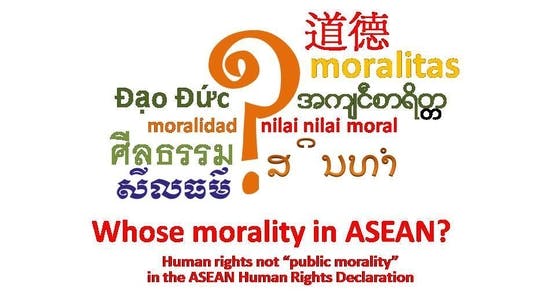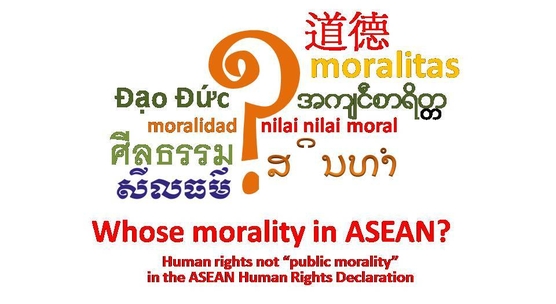Whose morality in ASEAN anyway: Strike out “public morality” from the ASEAN Human Rights Declaration
Jan 21, 2015
Story


PLEASE SIGN THE PETITION:
http://www.change.org/petitions/aichr-drop-public-morality-from-the-asea...
As the ASEAN Human Rights Declaration (AHRD) nears finalization, there are still many reasons for us to worry. There is a high chance for the term “public morality” to be used as a limitation of human rights. There is also no assurance that women’s human rights especially those around sexual and reproductive health and rights, sexual orientation and gender identity, rights in marriage and family life and freedom of movement and citizenship, will be recognized.
Although “public morality” has been used as a limitation of human rights in the 1949 Universal Declaration of Human Rights (UDHR) and in the constitutions of several ASEAN member states, we have realized that identities, relationships and social relations are much more diverse. At the same time there are multiple forms of discrimination and violence than more than half a century ago:
Despite the ban in 2006, Indonesian girls in rural communities still undergo female genital mutilation as a sign of chastity. In the Philippines, it is easier to charge a married woman with adultery than a man who has to be caught living with another woman. In some parts of Cambodia and Laos, women are obliged by their culture to give birth in the forest without birth attendants, risking both the lives of mothers and infants. In Malaysia, same sex relationships are punishable with 10 years imprisonment while LGBT individuals are prohibited from starting families. These and other forms of discrimination and violence could potentially be justified by invoking "public morality."
Yet “public morality” has never been defined in any international human rights standard, unlike concepts such as public health and safety. Instead experience suggests that it has been interpreted based on the dominant patriarchal and religious hierarchies. Human rights need to evolve to facilitate the full exercise of human rights in the midst of current challenges and threats. The evolution of human rights, often expressed in the recommendations of the Convention on the Elimination of All Forms of Discrimination Against Women (CEDAW) or the resolutions of the Human Rights Council (HRC), for example, adds value to existing human rights standards.
Omitting the term “public morality” in the AHRD will not contradict the national constitutions which still have it as a ground for limitation of rights nor the UDHR. Instead, such ommission will contribute positively to the discourses which broaden the interpretation of international human rights standards.
More importantly, the AHRD must be sensitive to the lived experience of the region’s communities, especially women and girls whose gender and other social status have made it more difficult to endure, resist and act on past and present mechanisms of patriarchy, colonization and other forms fundamentalisms in family, education, religion, land acquisition and trading systems, militarization, labor and migration, among many others.
We ask the ASEAN Intergovernmental Commission on Human Rights (AICHR) and the ASEAN foreign ministers to undertake the following:
· Omit any reference to “public morality” as a limitation of human rights
· Follow international human rights standards and contribute to the evolution of human rights discourses.
· Engage ASEAN communities and human rights experts through meaningful consultations on the AHRD beginning with the public release of the draft AHRD.
[Note: Following the first consultation on the ASEAN Human Rights Declaration (AHRD) on 22 June 2012 in Kuala Lumpur, Malaysia, there are indications that “public morality” remains a ground for the limitation of rights. This, despite the support of a few representatives of the ASEAN Intergovernmental Commission on Human Rights, the body tasked to produce the AHRD. The AHRD is set to be approved in November 2012.]




